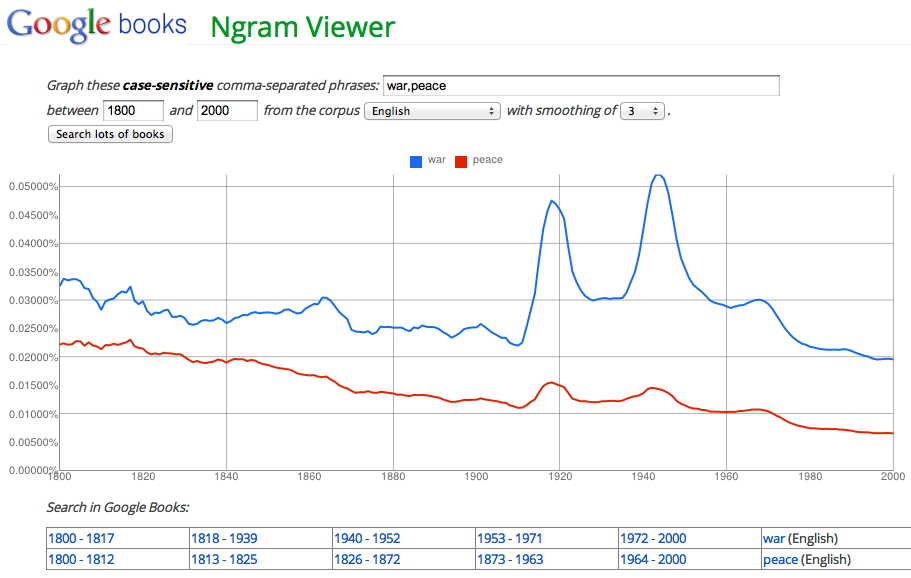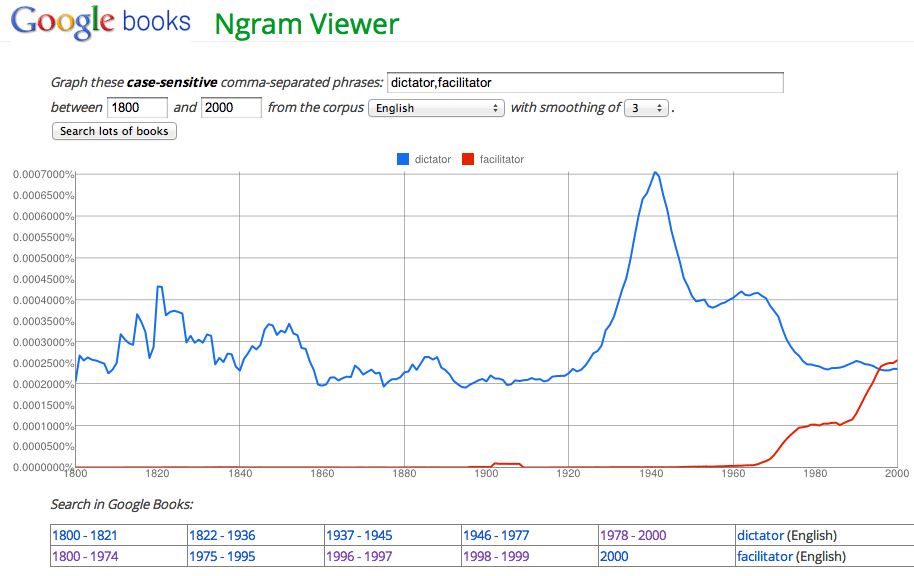Comparing facilitators vs dictators we surprisingly discover that the term ‘facilitator’ becomes more popular. As measured by frequency of use, the trend for facilitator rises since 1995. The message is clear. If you want to be more popular, be a facilitator and not a dictator!
For example, in the chart and results below, we compared the occurrences of the terms ‘war’ and ‘peace.’ As you can tell, the use of both terms are declining. The term ‘war’ remains largely prevalent and the term ’peace’ experienced a slight rise during the Viet-Nam conflict era, the 70’s.
“Brain Breaks” and other mental stimulation are valuable for increasing group performance as measured by the velocity and innovativeness of ideas. Therefore, use Google’s Ngram Viewer as a way to stimulate group energy, team building, and topic-related discussion—all at the same time. Consequently, have some fun on your own, and help get participants back from breaks and lunch in a timely fashion with this tool. For other “Brain Breaks” do not forget to access your MG RUSH alumni resources.
-

War or Peace
Simply turn your browser to http://books.google.com/ngrams and insert commas to separate phrases or terms and compare their occurrence in published English language books over the past 200 years.

Facilitators vs. Dictators
______
Don’t ruin your career by hosting bad meetings. Sign up for a workshop or send this to someone who should. MGRUSH workshops focus on meeting design and practice. Each person practices tools, methods, and activities every day during the week. Therefore, while some call this immersion, we call it the road to building high-value facilitation skills.
Our workshops also provide a superb way to earn up to 40 SEUs from the Scrum Alliance, 40 CDUs from IIBA, 40 Continuous Learning Points (CLPs) based on Federal Acquisition Certification Continuous Professional Learning Requirements using Training and Education activities, 40 Professional Development Units (PDUs) from SAVE International, as well as 4.0 CEUs for other professions. (See workshop and Reference Manual descriptions for details.)
Want a free 10-minute break timer? Sign up for our once-monthly newsletter HERE and receive a timer along with four other of our favorite facilitation tools, free.
- Fun with Google Books Ngram Viewer (householdopera.typepad.com)
- ngram.sh: a script for extracting Google Ngram data (opendna.com)
- Live post: In search of the first use of ‘Data/Information Visualization’ (visualisingdata.com)
- How not to do things with words. (tedunderwood.wordpress.com)

Terrence Metz, president of MG RUSH Facilitation Training, was just 22-years-old and working as a Sales Engineer at Honeywell when he recognized a widespread problem—most meetings were ineffective and poorly led, wasting both time and company resources. However, he also observed meetings that worked. What set them apart? A well-prepared leader who structured the session to ensure participants contributed meaningfully and achieved clear outcomes.
Throughout his career, Metz, who earned an MBA from Kellogg (Northwestern University) experienced and also trained in various facilitation techniques. In 2004, he purchased MG RUSH where he shifted his focus toward improving established meeting designs and building a curriculum that would teach others how to lead, facilitate, and structure meetings that drive results. His expertise in training world-class facilitators led to the 2020 publication of Meetings That Get Results: A Guide to Building Better Meetings, a comprehensive resource on effectively building consensus.
Grounded in the principle that “nobody is smarter than everybody,” the book details the why, what, and how of building consensus when making decisions, planning, and solving problems. Along with a Participant’s Guide and supplemental workshops, it supports learning from foundational awareness to professional certification.
Metz’s first book, Change or Die: A Business Process Improvement Manual, tackled the challenges of process optimization. His upcoming book, Catalyst: Facilitating Innovation, focuses on meetings and workshops that don’t simply end when time runs out but conclude with actionable next steps and clear assignments—ensuring progress beyond discussions and ideas.




Fun tool. The word “consultant” is also in decline.
Perhaps because the verb “consult” is a contronym. As such, it is never clear whether the consultant is giving me something, or I need to give the consultant something when I “consult” with them. See “consult.”